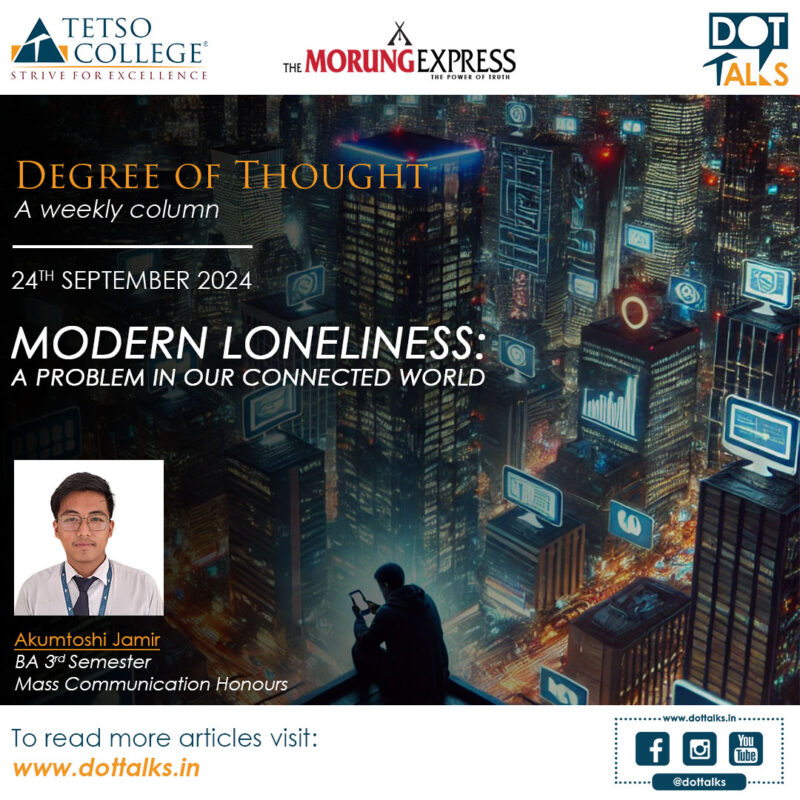
Modern Loneliness: A Problem in our Connected World
In today’s world, technology promises to keep us connected all the time. We have social media, messaging apps, and digital platforms at our fingertips. But here’s the twist: despite all these connections, loneliness seems to be getting worse. Isn’t that ironic? Even though we are more connected than ever, we are feeling isolated. This growing issue highlights changes in how we connect with ourselves and each other.
The Puzzle of Modern Loneliness
Loneliness isn’t a new feeling. It’s something humans have dealt with forever. However, modern loneliness is a bit different from what people used to feel. Long ago, loneliness often happened when someone was physically aloneᅳlike living in a quiet area or losing someone close. Nowadays, loneliness can hit even in busy cities or even when you’re surrounded by lots of friends.
I was inspired by Lauv’s song “Modern Loneliness” that meant to speak to the “modern” concept of loneliness as defined by Lauv. And as he describes it, it is pretty much defined as always being in the company of people yet still feeling alone. This song revolving around feeling lonely in the modern age, the lyrics express that although people are more connected than ever due to the rise of social media, this connection still has its negative effects as most are not genuine and does not replace real-life relationships.
How Loneliness Affects Our Mental Health
Feeling lonely can have deep effects on our emotions. When it goes on for too long, it can lead to serious issues like depression, anxiety, and low self-esteem. Many who feel really lonely start thinking they aren’t good enough. They might feel hopeless too.
Research shows that loneliness can impact our physical health as well! It can raise stress levels and make our immune systems weaker; some studies even say it’s as bad as smoking 15 cigarettes a day!
For younger folks like Gen Z and millennials, loneliness is a big problem now. Even though they’re online all the time, they report feeling lonelier than older generations. Spending lots of time on social media can make them compare themselves with others and feel inadequate. Plus, they’re often going through big life changesᅳlike leaving home or starting new jobsᅳwhich can make them feel even more isolated.
How Individualism Affects Us
The focus on individualism in our society might also add to these feelings of loneliness. In many places, being successful means achieving personal goals rather than supporting others in the community. People often put their dreams first, which sometimes takes them away from friends and family.
Many people move away from their hometowns for jobs or education, but this can leave them without old friends and support systems. Sure, these moves may bring new opportunities; but finding new friends in a busy world is tough! When work takes up so much time (which it often does), people find it hard to connect with others.
This hustle culture promotes long hours at work instead of hanging out with friends or family. While chasing career goals feels rewarding, many people end up feeling drained and alone.
How to Tackle Modern Loneliness
Facing modern loneliness needs action from both individuals and society. First off, we need to admit when we’re feeling lonelyᅳit’s okay! Everyone feels this way sometimes. By recognizing it’s common, we can start taking steps to change things for the better. Simple things like reaching out to friends or joining groups can help break that isolation cycle.
Building deeper connections matters too! Instead of sticking only to texting or quick messages, let’s talk face-to-face when we can! Real conversationsᅳwhether through video chats or in personᅳhelp us bond on a deeper level.
On a larger scale, communities should rethink how they create spaces for connection. Urban planners could design parks and community areas that encourage socializing! Employers should help workers find balance between their job & personal livesᅳthis way employees have time to nurture friendships too! Governments could offer support for mental health programs focusing on loneliness.
Conclusion
Modern loneliness is a complex struggle between hyper-connectivity and emotional isolation. While technology has brought us closer together in many ways, it has also created new avenues for loneliness. The constant stream of information and the pressure to maintain an online presence can leave us feeling overwhelmed and disconnected from meaningful human interaction.
As we navigate this digital age, let’s prioritize building real connections and supporting one another. By being understanding and empathetic, we can foster a sense of belonging and combat the pervasive feeling of isolation. Let’s take proactive steps to bridge the gap between our online and offline lives. Whether it’s joining local communities, volunteering, or simply making time for face-to-face interactions, we can create happier and more connected communities for everyone.
Together, we can unravel the puzzle of modern loneliness and weave a tapestry of belonging and support.
Degree of Thought is a weekly community column initiated by Tetso College in partnership with The Morung Express. Degree of Thought will delve into the social, cultural, political and educational issues around us. The views expressed here do not reflect the opinion of the institution. Tetso College is a NAAC Accredited UGC recognised Commerce and Arts College. The editorial team includes Chubamenla, Asst. Professor, Dept. of English and Rinsit Sareo, Asst. Manager, IT, Media & Communications.
For feedback or comments please email: dot@tetsocollege.org

